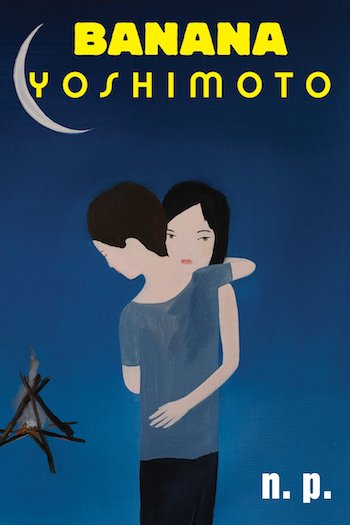I wasn’t planning on covering Banana Yoshimoto’s N.P. (also published as NP and np), translated by Ann Sherif in the QUILTBAG+ Speculative Classics series, but I picked it up at a book sale and it opened to the following sentence in the afterword: “I have attempted, in this miniature universe, to touch on as many of the themes that interest me as possible (lesbianism, love within the family, telepathy and empathy, the occult, religion and so on).” That definitely sounds both QUILTBAG+ and speculative! I was surprised the book qualified for my column, given that it was published as a non-speculative work; and it’s especially hard to find translated novels to discuss here, so I bought it right away. I was anxious about incest as a theme immediately following queerness, but I figured I’d still give the book a try.
(For readers who want to avoid these topics, though, please be aware that the novel involves both incest and suicide, and both topics are touched on in the article that follows).
Banana Yoshimoto is a Japanese woman author also popular in translation; she picked her pseudonym “Banana” because it sounded “cute and androgynous.” She started writing in the late 1980s, and some of her works were runaway international successes with multiple movie adaptations based on her novels.
Her novel N.P. is from 1990 and was translated to English in 1994; its plot begins in then-contemporary Japan. Sarao Takase is a famous and entirely fictional Japanese writer who moves to the U.S. and writes in English—primarily odd, offbeat flash stories, collected in the bestselling book N.P., which is published just before his death by suicide. N.P. is short for North Point, “the title of an old song” according to one of the characters (p. 5). I’m presuming this is Mike Oldfield’s “North Point” featuring Anita Hegerland, an appropriately spooky and cryptic piece.
The book is narrated by our protagonist Kazami, whose boyfriend Shoji translates N.P. into Japanese, and even obtains the manuscript of a further story that’s not collected in the volume; then he kills himself, too. Three years later, Kazami meets the writer’s son Otohiko, who’s recently moved back to Japan, and she learns that Shoji was not the only one to take his own life while working on the translation…
“Works of art imbued with curious, sometimes deadly powers” is a small niche sub-subgenre of horror and Weird fiction that I personally enjoy. (For a recent exemplar, I recommend A Spectral Hue by Craig Laurance Gidney, who was previously featured in my column with his collection Sea, Swallow Me.) But in this narrative, the emphasis is more on the interrelations of characters with ties to Sarao Takase than the art itself. The mysterious additional story focuses on incest, specifically on a relationship between an older man resembling the fictional author, and his adult daughter—possibly Otohiko’s sister Saki? But Sarao Takase had another daughter from a different mother, and she soon appears in the narrative, too. (The translation uses “stepbrother” while the relationship in the narrative is about half-siblings, as is clarified at one point; I’m assuming this is simply a copyediting error.)
Buy the Book


Docile
As Kazami becomes more closely acquainted with everyone with an interest in the manuscript, danger begins to swirl around her. She also discovers multiple romantic relationships between relatives that go beyond the fictional depictions in Takase’s work. People in the narrative generally don’t think incest is acceptable, and they struggle with it. The situation is similar to the classic Oedipus narrative, where someone initially doesn’t know they’re biologically closely related to their new partner, but the plot is much more complicated than that. At the same time, the tangle is presented in an easy-to-follow way: N.P. is a quick and relatively short read, with an airiness to its prose.
Despite this airy, light feel, there is a lot of agitation in the story. At one point, Kazami complains, “Recently I’ve been feeling like all […] of you have been parking your emotions at my doorstep” (p. 83). She has no blood ties to anyone involved with the manuscript, but in the heightened state of emotion stirred up by the events of the story, she’s beginning to experience attraction herself… to one of the women. Kazami seems to be bisexual—just like her love interest—and also contemplates starting a relationship with one of the men.
This is a novel that goes beyond strict genre categories. We come across potentially evil spirits and odd premonitions, yet the emphasis is never on the supernatural horror elements. (In fact, they are not portrayed as supernatural; they are seen as a mysterious part of everyday life, especially when life is as intense as it for these characters.) There is a kidnapping attempt and a poisoning; yet this is not a crime novel, either. We can call it a “literary” work, but that would ignore the genre elements, and N.P. is definitely of interest to speculative readers. And besides, the “literary novel” is a genre too, with one of its characteristics front and center in the case of N.P.: we get to see a lot of questionable behavior from practically all characters. Just one example, from someone arguing against undergoing DNA testing to find out if they’re related to another character: “If I don’t get tested, then at least I can say that I don’t know for sure, and that can be my out. It’s like trying to get decide whether to get tested for AIDS.” (p. 68) That’s really rather terrible to say, but the author is clearly aware of that. Likewise, both queer and straight relationships have nonconsensual elements, and even non-romantic relationships exhibit these, as well. This is not one of those books where you have the “good guys” and the “bad guys”, and you can pick a side to root for. You can see from the beginning that it will not end well, and the focus is on the process of getting there—it’s uncomfortable, and it’s intended to make you uncomfortable.
Without spoiling the ending, I do think I should state—especially because of the queer aspects involved—that it is not happy. Yet the book doesn’t end in all-encompassing, crushing tragedy either, as one might expect from the Oedipal setup. It’s sad and melancholy and bittersweet and uneasy. Part of that comes from the heterosexist social context, but most of it is in fact related to the male-female relationships in the narrative.
Throughout the novel, it’s important to note that queerness is not particularly equated with incest. Both are shown to go against societal taboos, but the only time the two are even indirectly connected is in the AIDS-related quote above. But they are indeed both present, so some people may invariably connect them; and they are treated as quasi-controversial themes. I personally felt that the queerness was presented as more acceptable than the incest, but this might be coming from my perspective as a present-day reader.
Something I found very personally resonant was for the most part unconnected to queerness, save for the fact that both contributing to an uneasy experience in the life of the protagonist. Like her former boyfriend, Kazami also works as a translator, and there is ample discussion of translation, migration, and the feeling of being out of place. This is a translated novel about translation and there is also another translated novel hiding inside it—it’s all very meta, but gracefully so. Nothing about N.P. felt forced to me; it was sparse, with the kind of sparseness that hides surprising complexities. And while this worked for me well while I was actually reading the book, I found that the novel failed to stick in my memory; I first read it a few weeks before I was able to sit down and write this review, and I needed to refer back to my copy more often than I would have liked. Still, I was glad I’d picked it up, and I ended up thinking quite a lot about the plot.
Banana Yoshimoto has written other queer books, and other books with speculative elements, so I might be able to review more of her work for my column if the two themes overlap. But next time, I am planning on covering a novel that you voted for: Slow River by Nicola Griffith! It has already been teased to me as “the book which will make you care about wastewater management”—and to be honest, that sounds right up my alley, so I’m very much looking forward to reading it next.
Bogi Takács is a Hungarian Jewish agender trans person (e/em/eir/emself or singular they pronouns) currently living in the US with eir family and a congregation of books. Bogi writes, reviews and edits speculative fiction, and is a winner of the Lambda Literary Award and a finalist for the Hugo and Locus awards. You can find em at Bogi Reads the World, and on Twitter and Patreon as @bogiperson.










